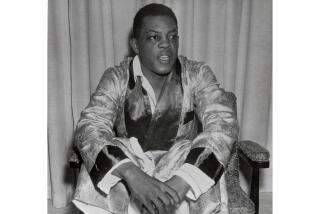Kimberly Mays Moves in With Birth Parents : Family: Teen-ager switched as newborn asks to stay with couple she told court she never wanted to see again. ‘Personal difficulties’ cited.
- Share via
MIAMI — Kimberly Mays, the girl who was switched at birth and became the center of one of the nation’s most celebrated custody fights, has moved in with her biological parents--the same couple she once told a court she never wanted to see again.
The surprise move follows weeks of turmoil in the life of the 15-year-old, who for the past several days had been living in a Sarasota YMCA shelter for troubled teens.
An attorney for the girl’s court-appointed guardian confirmed Wednesday that Robert Mays, the only father Kimberly has ever known, approached Ernest and Regina Twigg about taking her into their home on a “temporary and informal” placement.
“Kimberly Mays has been experiencing certain unique personal difficulties in trying to deal with certain teen-age issues that face all teens,” said attorney David L. Denkin in a statement.
“Mr. and Mrs. Mays will maintain parental control and open communications with Mr. and Mrs. Twigg. . . ,” said Denkin. “It is hoped by both families that as a result of the two families’ communication and joint efforts toward Kim’s best interests that Kim will pass through this difficult time and once again be able to direct her efforts to her education and growth.”
Kimberly has moved into the Twiggs’ home in Sebring, Fla., and is expected to enter high school there immediately.
The move by the slight, blond teen-ager adds another remarkable chapter to a wholly improbable saga, and represents a complete turnabout for a girl who last August tearfully recounted for a judge and a national audience watching on cable TV how she begged Robert Mays, “Please, don’t let them take me away.”
The Twiggs, who have seven other children, have been fighting to win parental custody and visitation rights since 1988. That year a blood test following the death of their daughter Arlena revealed that she could not have been their child.
Detective work along trails of medical records eventually established that Arlena and Kimberly had been switched in December, 1978, in a Wauchula, Fla., hospital, where both were born three days apart.
The Twiggs sued for custody of Kimberly, even suggesting that Robert Mays and his late wife may have orchestrated the switch of infants after discovering that their daughter had a congenital defect that would eventually kill her.
Mays denied any role in the switch, and while conceding that Kimberly is not his biological child, argued that Kimberly should be free to stay with the father she had known from infancy. In a landmark ruling hailed by proponents of rights of minors, Circuit Judge Stephen Daken agreed.
“The evidence is clear that Robert Mays is her psychological parent and that the plaintiffs are seen by her as a constant source of danger to her father and to her family relationship,” Daken wrote in his opinion.
Furthermore, the judge criticized the behavior of the Twiggs, saying their earlier efforts to forge a relationship with the girl had “created a chasm . . . that may never be bridged.”
Both the Mays and Twigg families have become millionaires as a result of the infant switch and its emotional aftermath. In September, 1992, Robert and Kimberly Mays accepted $6.6 million in a settlement of their suit against the hospital. The Twiggs had earlier settled for $3.5 million.
Word that Kimberly Mays had left the Sarasota shelter and moved in with the Twiggs in Sebring set off a news media free-for-all in the Central Florida town of 8,700. Ernest Twigg wrestled briefly with a news photographer Wednesday afternoon as other family members screamed at reporters to stay away.
Anticipating a continuing media onslaught, however, the Highlands County Sheriff’s Department designated as a staging area a field across from the high school.
“It’s sad that she got gypped out of life like that,” Sebring High student Shannon Brown told one reporter. “But I’m glad she’s coming here.”
Researcher Anna Virtue contributed to this story.
More to Read
Sign up for Essential California
The most important California stories and recommendations in your inbox every morning.
You may occasionally receive promotional content from the Los Angeles Times.













